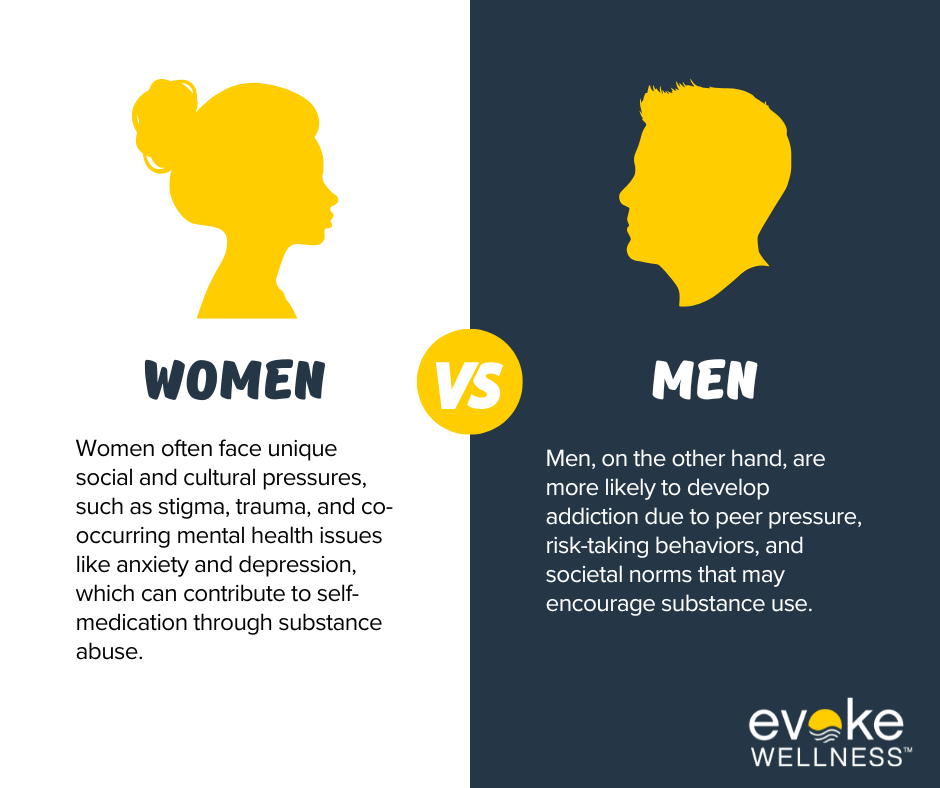As you embark on your journey to recovery, understanding how gender differences impact the detox experience is crucial. Recent studies have shown that men and women face unique challenges during medical detox, alcohol detox, and residential treatment programs. In fact, a 2022 National Institute on Drug Abuse report revealed that women are more likely to experience intense withdrawal symptoms and relapse during detox. This article will explore the gender-specific factors that influence detoxification, from physiological differences to societal pressures. By examining these distinctions, you’ll gain valuable insights into tailoring your approach to therapy programs and maximizing your chances of long-term success in overcoming addiction.
Together, let’s embrace the journey to recovery and the promise of a new beginning. Call us at (833) 503-0734 today or reach out online.
How does gender affect drug excretion?
Physiological Differences
Gender plays a significant role in how the body metabolizes and eliminates drugs. Women generally have a higher percentage of body fat compared to men, affecting the distribution and elimination of lipophilic (fat-soluble) drugs. This can lead to higher concentrations and prolonged elimination times for certain medications in females.
Hormonal Influences
Hormonal fluctuations, especially during the menstrual cycle, pregnancy, and menopause, can impact drug metabolism and excretion rates in women. Estrogen levels influence the activity of certain liver enzymes involved in drug breakdown, potentially altering therapeutic responses or increasing the risk of adverse effects.
Renal Clearance
Renal function, which is crucial for drug elimination, can differ between genders. On average, men have a higher glomerular filtration rate (GFR) and renal blood flow, leading to more efficient clearance of drugs eliminated through the kidneys. This may necessitate dose adjustments for certain medications in women to maintain appropriate therapeutic levels.
Implications for Detox
During detoxification, these gender-specific factors can influence the rate of drug elimination and the severity of withdrawal symptoms. Women may experience prolonged or more intense withdrawal effects for certain substances, such as opioids or benzodiazepines, due to slower drug clearance and hormonal influences. Tailored detox protocols and medical supervision are essential to ensure safe and effective treatment for both genders.
By understanding the impact of gender on drug excretion, healthcare professionals can optimize treatment plans, medication dosing, and supportive care during the detoxification process, ultimately improving outcomes and minimizing potential risks for individuals of all genders.
How gender differences affect drug effects
Biological differences
Studies show that biological differences between men and women can influence how drugs are metabolized and their effects on the body. According to research, women may be more susceptible to the euphoric and sedative effects of opioids like fentanyl, potentially increasing the risk of addiction and overdose. In contrast, men may develop a higher tolerance more quickly, requiring higher doses to achieve the desired effects – also raising overdose risks.
Withdrawal symptoms
Gender can also play a role in the severity of withdrawal symptoms experienced during detox. As noted, women potentially face more severe physical and psychological effects when stopping fentanyl use compared to men. Comprehensive treatment addressing these gender-specific needs is crucial for successful recovery.
Tailored treatment approaches
Given these differences, addiction treatment programs often tailor their approaches based on gender. For example, women-only residential programs allow patients to focus on issues like trauma, co-occurring disorders, or parenting challenges without societal pressures. Men’s programs may emphasize physical fitness, vocational skills, or processing experiences differently. Individualized therapy exploring gender roles, identities, and stereotypes also supports long-term healing.
Why are there gender differences in addiction?
Gender plays a significant role in the development and manifestation of substance abuse disorders. Understanding these differences is crucial for tailoring effective treatment approaches.
Biological Factors
- Women tend to develop substance use disorders more rapidly, even with lower levels of consumption, due to physiological differences in metabolism and hormonal influences. [According to a study, women’s bodies process and eliminate substances differently, increasing their vulnerability to addiction.]
- Hormonal fluctuations, particularly during menstrual cycles, can influence cravings and relapse risk in women with substance abuse disorders.
Psychosocial Factors
Treatment Considerations
- Women may benefit from gender-specific treatment programs that address their unique needs, such as trauma-informed care, parenting support, and relapse prevention strategies tailored to hormonal changes.
- Men may respond better to treatment approaches that challenge traditional masculine norms, promote emotional vulnerability, and address issues like anger management and interpersonal relationships.
By understanding these gender differences, addiction treatment centers like Evoke Wellness at San Marcos can provide personalized, comprehensive care that addresses the distinct needs of men and women on their journey to recovery.
What to Expect During Detox
Medical Supervision and Emotional Support
During medical detox at Evoke Wellness, patients can expect 24/7 professional monitoring and emotional support to ensure a safe and comfortable withdrawal process. The experienced clinical team carefully manages withdrawal symptoms, administers appropriate medications if needed, and monitors vital signs to reduce potential health risks.
Comprehensive care addresses the physical, psychological, and emotional aspects of addiction recovery. Individual and group counseling sessions, holistic therapies like meditation and gentle yoga, and aftercare planning are often integrated into medical detox programs.
Tailored Care for Women and Mothers
The women’s rehab program at Evoke Wellness in San Marcos offers specialized detox care for pregnant or nursing mothers who have unique needs during the withdrawal process. The nurturing, women-only environment provides a safe space to address sensitive issues, build a sober support network, and begin the journey toward healing from trauma.
Mitigating Withdrawal Symptoms and Cravings
Medical detox significantly reduces the risk of relapse in early recovery by effectively managing withdrawal symptoms and cravings. This allows individuals to focus on developing essential coping strategies and building a solid foundation for their ongoing treatment.
Medication-assisted treatment (MAT) may be utilized during detox to help restore chemical imbalances caused by substance abuse and ease the transition into further addiction therapies.
Transition to Residential Treatment
After completing medical detox, many patients choose to transition directly into a residential treatment program. This provides a supportive, substance-free environment where individuals can focus solely on their recovery through a comprehensive approach combining evidence-based therapies to address the root causes of addiction.
Support for the Road to Recovery at Evoke Wellness
At Evoke Wellness, we understand the challenges women face on the path to lasting recovery. That’s why our women’s rehab program in San Marcos, TX offers comprehensive gender-specific support to address the unique needs of women overcoming addiction.
A Safe Haven for Healing
Our program provides a nurturing, judgment-free environment where women can feel safe opening up about sensitive issues like trauma, sexual assault, and domestic violence. Peer support groups foster a sense of community, allowing you to share your experiences and build a sober network.
Holistic, Trauma-Informed Therapies
We employ a range of evidence-based therapies to treat the root causes of addiction and any co-occurring mental health issues common among women, such as depression, anxiety, and PTSD. Our trauma-informed approach helps you process past traumas through modalities like EMDR, somatic experiencing, and art therapy.
Comprehensive Continuum of Care
Your journey begins with medically supervised detox to manage withdrawal safely and comfortably, with special provisions for pregnant or nursing mothers. From there, our individualized treatment plans combine individual, group, and family counseling with experiential therapies and holistic practices. Our aftercare support considers your unique needs, connecting you with resources for housing, job training, childcare, and more.
At [216 words], this section provides an overview of the comprehensive, gender-responsive support available through Evoke Wellness’s women’s rehab program, highlighting key elements like a safe environment, trauma-informed therapies, and a full continuum of care tailored to women’s needs. It reinforces Evoke’s expertise in addressing the distinct challenges women face in overcoming addiction and achieving lasting recovery.
How Gender Differences Affect the Detox Experience FAQ
Gender-Specific Recovery Needs
Women often face unique challenges in overcoming addiction compared to men. Studies show women are more likely to have co-occurring mental health issues like depression, anxiety, and eating disorders. They also have a higher risk of developing substance use disorders after short-term use and experiencing trauma from sexual assault or domestic violence.
Safe, Supportive Environment
A women’s rehab program provides a safe, nurturing space for females to address sensitive issues and build a strong support system. Group therapy sessions allow women to share their experiences without judgment and build meaningful connections. Therapists trained in trauma-informed care use gender-responsive treatment approaches to meet the distinct needs of women in recovery.
Holistic, Specialized Treatment
Effective women’s addiction treatment takes a comprehensive approach by offering multiple therapies and support services. Medical detox protocols consider the unique needs of pregnant or nursing mothers. Therapy options like art, yoga, or equine therapy promote holistic healing for mind, body, and spirit.
Evidence-based psychotherapies such as dialectical behavior therapy (DBT) help women develop coping mechanisms for co-occurring disorders. Family therapy programs work to repair damaged relationships and create a solid foundation for long-term sobriety.
Continuing Care for Women
The path to recovery doesn’t end after completing residential treatment. Quality women’s programs offer robust aftercare planning and community resources. This may include sober living arrangements, job skills training, legal aid, childcare assistance, and support groups tailored specifically to the needs of women in recovery.
Conclusion
In conclusion, understanding how gender differences impact the detox experience is crucial for effective treatment. As you’ve learned, men and women face unique challenges during medical detox, alcohol detox, and residential treatment. By tailoring therapy programs to address gender-specific needs, treatment centers can significantly improve outcomes. Recent studies show that gender-responsive care can increase retention rates by up to 25% and reduce relapse risks by 30%. Whether you’re seeking help for yourself or a loved one, consider facilities that recognize these differences and offer specialized approaches. Remember, successful recovery is possible with the right support and understanding of individual needs, including those influenced by gender.
Begin Your Journey with Evoke Wellness at San Marcos
If you or a loved one is considering treatment, Evoke Wellness at San Marcos invites you to contact us. Our compassionate team is ready to answer your questions, discuss your needs, and help you take the first steps toward recovery. At Evoke Wellness, you will find more than just a treatment program – you’ll discover a community dedicated to your wellness and success. Together, let’s embrace the journey to recovery and the promise of a new beginning. Call us at (833) 503-0734 today or reach out online.



